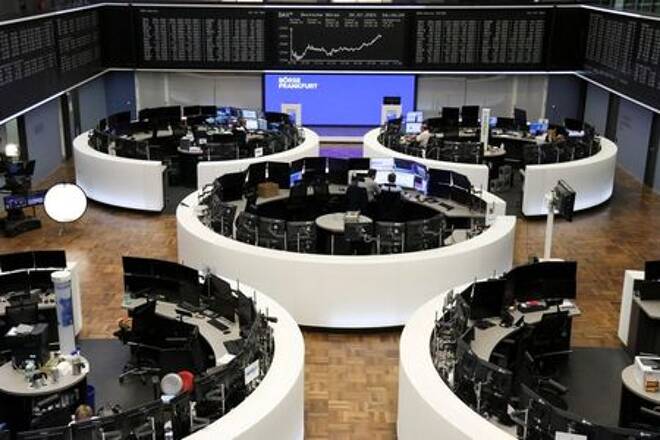Advertisement
Advertisement
Wall Street Set to Open Higher; Oil Hit by China Demand Concerns
By:
SYDNEY (Reuters) - Asian shares were seeking a modicum of stability on Monday as a run of stellar U.S. corporate earnings put a floor under markets, though Beijing's regulatory crackdown continued to reverberate amid disappointing economic news.
By Elizabeth Howcroft
LONDON (Reuters) -European shares rose and U.S. stock index futures pointed to a stronger open for Wall Street on Monday with risk appetite boosted by a U.S. infrastructure bill, though oil prices were hit by concerns about Chinese demand.
The MSCI world equity index, which tracks shares in 49 countries, was up 0.4% at 1114 GMT, after Asian shares recouped some of their recent losses.
MSCI’s main European Index rose around 0.3%, while the Stoxx 600 hit a new all-time high in early trading, before gradually easing, last up 0.3%.
Manufacturing activity across the euro zone continued to expand at a blistering pace in July as the reopening of the economy led to rocketing demand, but supply bottlenecks sent input costs soaring.
The Purchasing Managers’ Index (PMI) survey came after official data on Friday showed the bloc’s economy grew faster than expected in the second quarter.
George Buckley, chief UK and euro area economist at Nomura said he expects economic activity to remain strong but that a key question among clients is when the rate of growth will slow.
“It’s likely in my view that we will see a very sharp fall-off in the PMIs not because we are looking at a much weaker outlook but…the low-hanging fruit has now been picked.”
Risk appetite was also boosted by the prospect of more fiscal stimulus in the United States, as senators introduced a sweeping $1 trillion infrastructure spending plan.
Wall Street futures rose, with S&P 500 e-minis up 0.4% and Dow e-minis up 0.2%.
Earlier in the session, Chinese stocks rebounded after a sell-off caused by Beijing’s regulatory crackdown.
China’s Communist Party’s top decision-making body said on Friday that China will stick with its current economic policies in the second half of the year.
“We think the regulatory changes will continue and the direction is unlikely to be reversed, though the pace could be adjusted,” wrote JP Morgan strategists in a note to clients.
Oil prices were down after a survey found that China’s factory activity growth slipped sharply in July as demand contracted for the first time in over a year, prompting concerns about demand in the world’s second-largest oil consumer.
At 1122 GMT, Brent crude oil futures were down 1.3% and U.S. West Texas Intermediate (WTI) crude futures were down 1.5% on the day.
Market attention now turns to U.S. manufacturing activity data for July, as well as the Reserve Bank of Australia meeting on Tuesday, the Bank of England meeting on Thursday, and U.S. payrolls data on Friday.
Key bond yields declined in July. As the new month began, Europe’s benchmark 10-year German Bund yield was slightly higher on the day at -0.448%, having kicked off July at around -0.2%.
The 10-year U.S. Treasury yield was at 1.2288%, little changed on the day but having seen a gradual decline since April.
In currencies, the dollar index was down around 0.2% at 91.969, hovering just above a one-month low, while the euro was up around 0.2% at $1.1887.
The Australian dollar, which is seen as a liquid proxy for risk appetite, was up 0.2%.
(Reporting by Elizabeth Howcroft; Editing by Mike Harrison, Kirsten Donovan)
About the Author
Reuterscontributor
Reuters, the news and media division of Thomson Reuters, is the world’s largest international multimedia news provider reaching more than one billion people every day. Reuters provides trusted business, financial, national, and international news to professionals via Thomson Reuters desktops, the world's media organizations, and directly to consumers at Reuters.com and via Reuters TV. Learn more about Thomson Reuters products:
Advertisement
